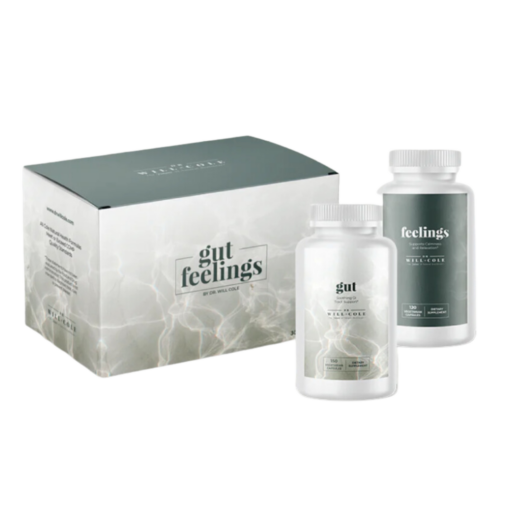Is Digestive Distress Keeping You Awake? What You Need To Know About the Gut Health + Sleep Connection

Trouble falling asleep and staying asleep is a problem for far too many people. While this lack of sleep is usually attributed to too much caffeine, stress, or just getting older, there's one health problem you are likely overlooking when it comes to your sleep troubles, and that is digestive distress. In fact, unresolved gut problems could be the one thing standing in your way of 8 hours of uninterrupted rest.
How gut health and sleep are actually connected
As a functional medicine practitioner, I am often asked, "Can poor gut health cause bad sleep?" The answer is a resounding yes! The intricate interplay between our gut and sleep is a subject of growing interest in the world of functional medicine. Numerous studies have revealed the pivotal role our gut health plays in regulating our sleep-wake cycles and overall sleep quality.
The gut, often referred to as our "second brain," houses trillions of microbes that communicate with our central nervous system through the gut-brain axis. When imbalances occur in this delicate ecosystem due to poor dietary choices, chronic stress, or environmental factors, it can lead to inflammation and sleep disruption.
While researchers are still uncovering new information about the gut-brain axis, what they have found is that there is a bi-directional relationship (1) between these two systems where your gut bacteria influences your sleep quality and your sleep quality (or lack thereof) can actually alter your gut health.
Unfortunately, many of us find ourselves stuck in this vicious cycle, struggling to get adequate rest which damages our gut health and further perpetuates our inability to fall asleep and stay asleep. And with studies showing a higher prevalence (2) of sleep disorders amongst patients with irritable bowel syndrome (IBS), it just goes to show how real this connection is between your gut health and sleep.
Your gut-brain axis at work
Now that we know that your gut health influences your sleep quality and vice versa, it’s important to understand exactly how they impact each other in order to know how to effectively address any sleep problems.
Poor gut health disrupts sleep-regulating hormones
Your sleep-wake cycle relies on the production and proper balance of various hormones and neurotransmitters. For example, your “happy neurotransmitter” , serotonin, plays a crucial role in promoting relaxation. And since a significant portion of serotonin is actually produced in your gut, an imbalanced microbiome can hinder its synthesis, leading to reduced serotonin levels and difficulty falling asleep at night.
Your gut microbiome also has a profound impact on the production and metabolism of melatonin - your body’s “sleepy time” hormone responsible for letting your body know that it’s time for sleep. Additionally, imbalances in your gut can trigger an overproduction of stress hormones like cortisol, which can further disrupt your circadian rhythm, throw off melatonin production, and make it even more challenging to fall asleep.
Poor sleep can lead to bacterial dysbiosis
As we said earlier, the gut-brain axis is a double edged sword when it comes to your sleep and gut health. Studies have even found that partial sleep deprivation can alter (3) your microbiome composition in as little as 48 hours!
This is because your microbiome also has its own circadian rhythm. Just like the ocean tides ebb and flow throughout the day, so do the different colonies of bacteria in your microbiome. These populations of bacteria increase and decrease depending on if we are awake, eating, or sleeping. Changes to your sleep patterns (like staying up too late) can throw off your microbiome’s normal rhythm.
Symptoms of poor gut health
Understanding the connection between poor gut health and its impact on sleep begins with recognizing the telltale symptoms of an imbalanced gut. Common symptoms of digestive distress include chronic bloating, gas, diarrhea, constipation, acid reflux, and difficulty losing weight.
However, the more we learn about the gut, the more we see how its influence extends far beyond your digestive system, often manifesting in seemingly unrelated symptoms:
- Anxiety
- Autoimmune conditions
- Brain fog
- Depression
- Food sensitivities
- Headaches
- Hormone imbalances
- Joint pain
- Nutrient deficiencies
- Skin problems (acne, eczema, rashes)
Recognizing these signs is crucial, as they can give you a clue as to whether or not your sleep problems are due to poor gut health or something else.
Natural solutions to improve your gut health and sleep
Depending on your particular gut health problems and if you have any other underlying dysfunctions, your health care practitioner may recommend more specific tools for your health case. But in general, these are some of my favorite tools you can implement today to support a healthier gut and a restful night’s sleep.
1. Optimize your diet
While it is important to stop eating foods that harm your gut, it is just as important to fill your diet with nutrient-dense superfoods that facilitate a healthy microbiome and sleep quality. Probiotic-rich foods like sauerkraut and yogurt will replenish your gut with the good bacteria it needs to thrive and fiber-rich vegetables act as fuel for your existing gut bacteria to thrive and multiply. For a complete guide on the best foods to heal your gut along with delicious recipes you can make at home, check out my article here.
Certain superfoods also help healthy neurotransmitter and melatonin production including walnuts (4) which are one of the best sources of naturally occurring melatonin. Some of my other favorite foods include cherries, turkey, and chamomile tea.
2. Target your supplements
You can’t supplement your way out of a poor diet, but you can take supplements to assist in your healing journey. A daily probiotic supplement like The Probiotic from my supplement line The Collection, will ensure you are getting in a daily dose of good bacteria into your microbiome and a magnesium supplement like The Magnesium, will give your neurotransmitters the support they need to function properly and encourage a state of relaxation before bed.
3. Cultivate a bedtime routine
When it comes to a good night’s rest, it is important to set yourself up for success before you even get into bed. By limiting technology use a few hours before you plan to go to sleep and incorporating tools like mindfulness and aromatherapy, you are giving your body the best chance for high-quality, uninterrupted sleep. For more information on how to cultivate the ultimate nighttime routine and my favorite tools for better sleep, check out my article here.
4. Manage your stress
As we mentioned earlier, imbalances in cortisol can make it impossible to fall asleep and can further impact your gut health. Since cortisol is released in times of stress, it is essential to get your stress levels under control if you want to sleep well each night.
Seeking help from a functional medicine expert
When your gut is happy, the rest of your health follows suit. From regulating your circadian rhythms, neurotransmitter production, and hormone balance, your gut plays a larger role in your sleep-wake cycle than what meets the eye. By addressing underlying gut dysfunctions and incorporating natural dietary and lifestyle tools you will be well on your way to getting a full 8 hours of sleep every night.
If you suspect that gut problems are behind your sleep troubles, schedule a telehealth consultation today to learn more about how we can help you using functional medicine.
As one of the first functional medicine telehealth clinics in the world, we provide webcam health consultations for people around the globe.
Start Your Health Journey Today
FUNCTIONAL MEDICINE CONSULTATIONS FOR PEOPLE AROUND THE WORLD
References:
- Smith, Robert P et al. “Gut microbiome diversity is associated with sleep physiology in humans.” PloS one vol. 14,10 e0222394. 7 Oct. 2019, doi:10.1371/journal.pone.0222394
- Wang, Ben et al. “Prevalence of sleep disorder in irritable bowel syndrome: A systematic review with meta-analysis.” Saudi journal of gastroenterology : official journal of the Saudi Gastroenterology Association vol. 24,3 (2018): 141-150. doi:10.4103/sjg.SJG_603_17
- Benedict, Christian et al. “Gut microbiota and glucometabolic alterations in response to recurrent partial sleep deprivation in normal-weight young individuals.” Molecular metabolism vol. 5,12 1175-1186. 24 Oct. 2016, doi:10.1016/j.molmet.2016.10.003
- Peuhkuri, Katri et al. “Dietary factors and fluctuating levels of melatonin.” Food & nutrition research vol. 56 (2012): 10.3402/fnr.v56i0.17252. doi:10.3402/fnr.v56i0.17252
The information on this website has not been evaluated by the Food & Drug Administration or any other medical body. We do not aim to diagnose, treat, cure or prevent any illness or disease. Information is shared for educational purposes only. You must consult your doctor before acting on any content on this website, especially if you are pregnant, nursing, taking medication, or have a medical condition.
Our content may include products that have been independently chosen and recommended by Dr. Will Cole and our editors. If you purchase something mentioned in this article, we may earn a small commission.

BY DR. WILL COLE
Dr. Will Cole, DNM, IFMCP, DC is a leading functional medicine expert who consults people around the globe, starting one of the first functional medicine telehealth centers in the world. Named one of the top 50 functional and integrative doctors in the nation, Dr. Will Cole provides a functional medicine approach for thyroid issues, autoimmune conditions, hormonal imbalances, digestive disorders, and brain problems. He is also the host of the popular The Art of Being Well podcast and the New York Times bestselling author of Intuitive Fasting, Ketotarian, Gut Feelings, and The Inflammation Spectrum.

Gut Feelings
Healing The Shame-Fueled Relationship
Between What You Eat And How You Feel

